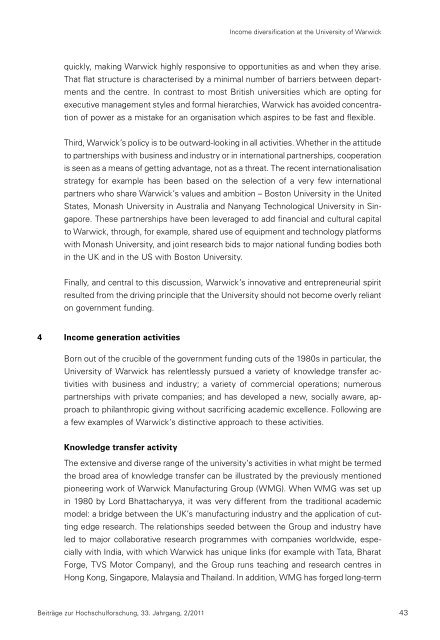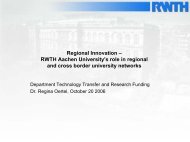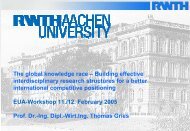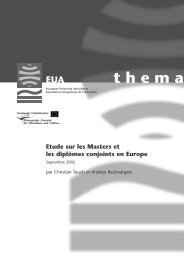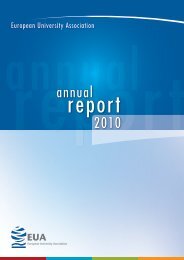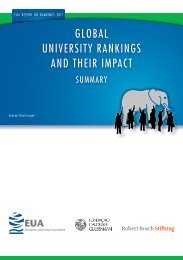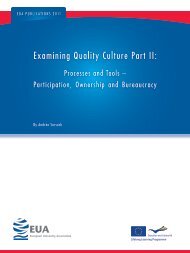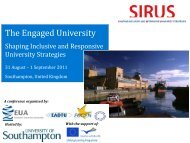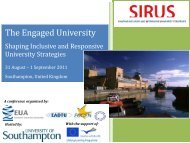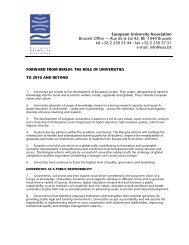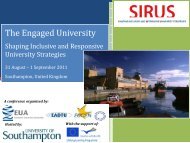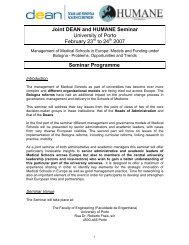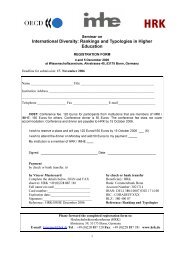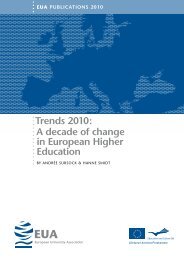Beiträge zur Hochschulforschung - European University Association
Beiträge zur Hochschulforschung - European University Association
Beiträge zur Hochschulforschung - European University Association
Create successful ePaper yourself
Turn your PDF publications into a flip-book with our unique Google optimized e-Paper software.
Income diversification at the <strong>University</strong> of Warwick<br />
quickly, making Warwick highly responsive to opportunities as and when they arise.<br />
That flat structure is characterised by a minimal number of barriers between depart-<br />
ments and the centre. In contrast to most British universities which are opting for<br />
executive management styles and formal hierarchies, Warwick has avoided concentra-<br />
tion of power as a mistake for an organisation which aspires to be fast and flexible.<br />
Third, Warwick’s policy is to be outward-looking in all activities. Whether in the attitude<br />
to partnerships with business and industry or in international partnerships, cooperation<br />
is seen as a means of getting advantage, not as a threat. The recent internationalisation<br />
strategy for example has been based on the selection of a very few international<br />
partners who share Warwick’s values and ambition – Boston <strong>University</strong> in the United<br />
States, Monash <strong>University</strong> in Australia and Nanyang Technological <strong>University</strong> in Sin-<br />
gapore. These partnerships have been leveraged to add financial and cultural capital<br />
to Warwick, through, for example, shared use of equipment and technology platforms<br />
with Monash <strong>University</strong>, and joint research bids to major national funding bodies both<br />
in the UK and in the US with Boston <strong>University</strong>.<br />
Finally, and central to this discussion, Warwick’s innovative and entrepreneurial spirit<br />
resulted from the driving principle that the <strong>University</strong> should not become overly reliant<br />
on government funding.<br />
4 Income generation activities<br />
Born out of the crucible of the government funding cuts of the 1980s in particular, the<br />
<strong>University</strong> of Warwick has relentlessly pursued a variety of knowledge transfer ac-<br />
tivities with business and industry; a variety of commercial operations; numerous<br />
partnerships with private companies; and has developed a new, socially aware, ap-<br />
proach to philanthropic giving without sacrificing academic excellence. Following are<br />
a few examples of Warwick’s distinctive approach to these activities.<br />
Knowledge transfer activity<br />
The extensive and diverse range of the university’s activities in what might be termed<br />
the broad area of knowledge transfer can be illustrated by the previously mentioned<br />
pioneering work of Warwick Manufacturing Group (WMG). When WMG was set up<br />
in 1980 by Lord Bhattacharyya, it was very different from the traditional academic<br />
model: a bridge between the UK’s manufacturing industry and the application of cut-<br />
ting edge research. The relationships seeded between the Group and industry have<br />
led to major collaborative research programmes with companies worldwide, espe-<br />
cially with India, with which Warwick has unique links (for example with Tata, Bharat<br />
Forge, TVS Motor Company), and the Group runs teaching and research centres in<br />
Hong Kong, Singapore, Malaysia and Thailand. In addition, WMG has forged long-term<br />
<strong>Beiträge</strong> <strong>zur</strong> <strong>Hochschulforschung</strong>, 33. Jahrgang, 2/2011 43


